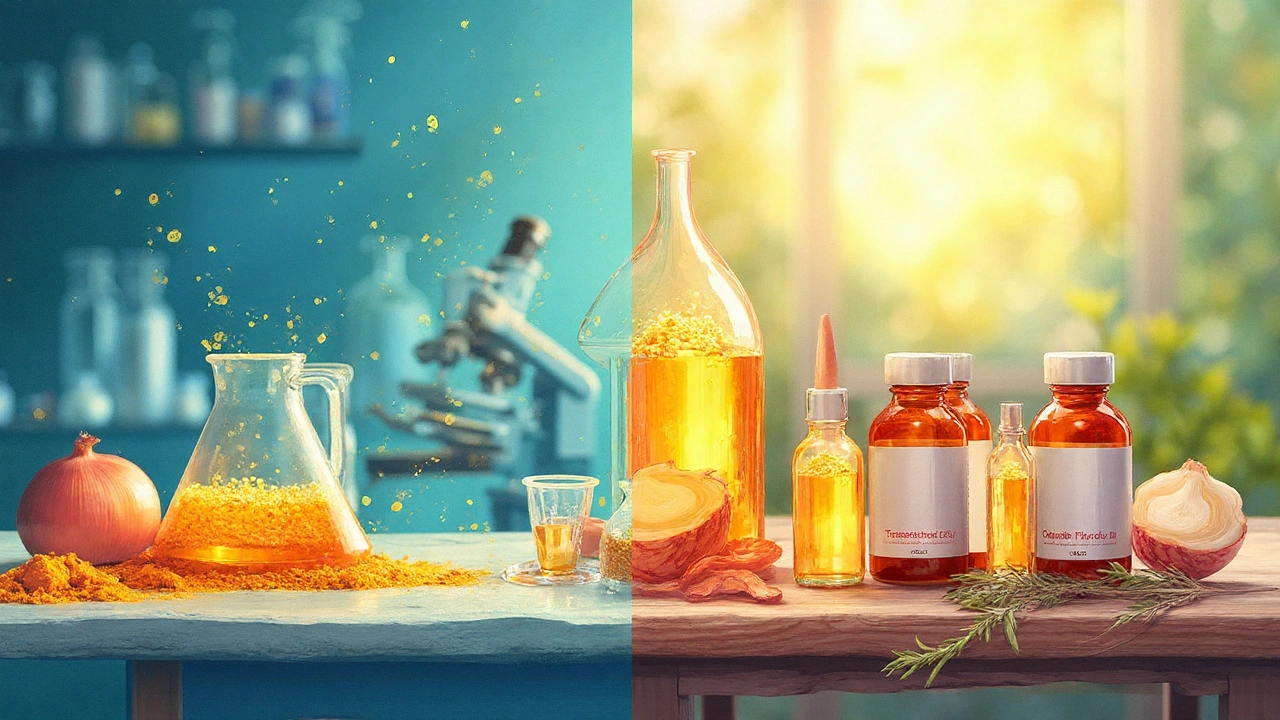Onion Dietary Supplement is a concentrated preparation of onion extracts, usually available in capsule, tablet, or powder form, designed to deliver the bioactive compounds of onions in a convenient daily dose. If you’ve ever wondered why chefs toss onions into almost every dish, the answer lies in the chemistry that goes beyond flavor. Modern nutrition science shows that the same phytochemicals that make you cry when chopping can also support heart health, blood sugar balance, and more. This article unpacks the science, helps you pick a quality product, and shows how onion supplements stack up against other popular plant‑based options.
What Makes an Onion Supplement Powerful?
Two families of compounds drive the health punch:
- Quercetin is a flavonoid that acts as a potent antioxidant and anti‑inflammatory agent. In onions, quercetin concentrations range from 20mg per 100g of raw onion to over 150mg in freeze‑dried extract.
- Sulfur compounds (including allyl‑propyl‑disulfide and thiosulfinates) provide detoxifying and antimicrobial properties. These are formed when onions are cut, releasing the enzyme alliinase.
When isolated and standardized, these molecules become more bioavailable than eating a regular onion, especially for people who can’t tolerate the strong taste or digestive gas.
Key Health Benefits Backed by Research
Below are the most consistently documented outcomes, each linked to a specific biological pathway.
- Cardiovascular health benefits from quercetin’s ability to improve endothelial function and lower LDL oxidation. A 2021 meta‑analysis of 12 randomized trials found a 7% reduction in systolic blood pressure for participants taking 500mg/day of quercetin‑rich onion extract.
- Blood sugar regulation is supported by sulfur compounds that enhance insulin signaling in muscle cells. A 2020 double‑blind study with pre‑diabetic adults reported a 0.4% drop in HbA1c after 8weeks of 300mg onion powder daily.
- Anti‑inflammatory effects arise from both quercetin and sulfur compounds dampening NF‑κB pathways, which translate into reduced joint pain for some arthritis patients.
- Gut microbiome modulation: prebiotic fibers in onion extracts promote growth of beneficial Bifidobacteria, indirectly boosting immunity.
These benefits are dose‑dependent, so quality matters.
How to Choose a High‑Quality Onion Supplement
Not all products are created equal. Look for the following attributes:
- Standardized quercetin content: aim for 100mg-150mg per serving.
- Verified sulfur compound profile: manufacturers should disclose total thiosulfinate levels (usually 20mg-30mg).
- Third‑party testing: NSF, USP, or ConsumerLab certifications guard against heavy‑metal contamination.
- Form and bioavailability: liposomal or phytosome technologies improve absorption compared to plain powder.
- Dosage instructions: most studies used 300mg-500mg of extract taken with food, split into two doses.
Pay attention to expiration dates. Onion polyphenols degrade over time, especially when exposed to heat and light.
Comparing Onion Supplements to Other Plant‑Based Options
| Supplement | Main Active Compound(s) | Typical Daily Dose | Primary Health Focus | Evidence Level |
|---|---|---|---|---|
| Onion Supplement | Quercetin + Sulfur compounds | 300-500mg standardized extract | Heart & blood‑sugar health | Moderate (multiple RCTs) |
| Garlic Supplement | Allicin (S‑allyl‑cysteine) | 600-1200mg aged garlic extract | Blood pressure & cholesterol | Strong (many meta‑analyses) |
| Turmeric Curcumin Supplement | Curcumin (with piperine) | 500-1000mg curcumin‑piperine blend | Inflammation & joint health | Strong (large RCTs) |
Onion supplements uniquely combine antioxidant and sulfur‑based detox pathways, making them a versatile addition for people already taking garlic or turmeric.

Potential Side Effects and Interactions
When taken as directed, onion supplements are generally safe. However, be aware of:
- Gastro‑intestinal discomfort (bloating, mild heartburn) - usually mitigated by splitting the dose.
- Increased bleeding risk: quercetin can inhibit platelet aggregation, so patients on anticoagulants (warfarin, clopidogrel) should consult a physician.
- Allergy considerations: individuals with strong onion or allium allergies may experience mild skin reactions.
Pregnant or nursing women should stick to food‑based onion intake rather than concentrated extracts unless advised otherwise.
Real‑World Example: How Jane Integrated an Onion Supplement into Her Routine
Jane, a 45‑year‑old marketing manager, struggled with borderline high fasting glucose (108mg/dL) and occasional ankle swelling. After a blood‑test review, her doctor suggested a supplement rich in quercetin. She chose a liposomal onion extract delivering 150mg quercetin and 25mg sulfur compounds per capsule. Taking one capsule with breakfast and another with dinner, she reported:
- Fasting glucose fell to 99mg/dL after 10weeks.
- Her ankle swelling reduced noticeably, likely due to improved circulation.
- No digestive upset, thanks to the split dosing.
Jane’s story highlights how a well‑chosen product can complement lifestyle changes (diet, walking) without drastic medication adjustments.
Related Concepts and Next Steps
Understanding onion supplements opens doors to broader nutritional strategies. Consider exploring:
- Phytonutrient synergy: Combining onion with garlic or turmeric may amplify antioxidant capacity.
- Prebiotic fiber sources: Leeks, shallots, and chicory root support the same gut‑friendly bacteria.
- Regulatory landscape: In the U.S., the FDA treats dietary supplements as foods, not drugs, meaning manufacturers are responsible for safety claims.
- Clinical trial databases: ClinicalTrials.gov lists ongoing studies on onion extract for cardiovascular outcomes.
Future articles could dive deeper into dosing protocols, the chemistry of thiosulfinates, or a head‑to‑head review of allium‑based supplements.
Frequently Asked Questions
How much onion supplement should I take daily?
Most clinical trials used 300mg-500mg of standardized onion extract per day, delivering roughly 100mg-150mg of quercetin. Split the dose into two servings with meals for better absorption and to minimize stomach upset.
Can onion supplements replace fresh onions in my diet?
Supplements are a convenient way to boost specific compounds, but they lack the fiber and broader nutrient profile of whole onions. Keep fresh onions in meals and use the supplement as an add‑on for targeted health goals.
Are there any medications that interact with onion supplements?
Quercetin can interfere with platelet aggregation, so anticoagulant drugs (e.g., warfarin, aspirin) may require dose adjustments. Always discuss with a healthcare professional before starting a new supplement.
What’s the difference between onion powder and onion extract?
Onion powder is simply dried, ground onion and contains the full food matrix but low concentrations of active compounds. Extracts are processed to concentrate quercetin and sulfur compounds, providing a higher, standardized dose per capsule.
Is there any risk of allergic reaction?
People with a known allergy to onions or other alliums should avoid concentrated supplements, as the allergenic proteins are still present. Mild skin irritation can occur in highly sensitive individuals.
How long does it take to see benefits?
Visible changes in blood pressure or blood glucose typically appear after 6-12weeks of consistent use, mirroring the timelines used in most clinical studies.









Sophia Lyateva
September 23, 2025 AT 18:54ok but what if onions are just a cover for the government’s secret mind control program?? i mean why else would they make you cry?? and why do all the big pharma companies sell onion supplements?? they dont want you to know the truth lol
AARON HERNANDEZ ZAVALA
September 24, 2025 AT 16:14i tried onion extract for a few weeks after reading this and honestly my joint pain did feel a bit better
no magic cure but it didnt hurt either
im still eating real onions too just in case
Lyn James
September 26, 2025 AT 06:11Let me be perfectly clear: this article is a dangerous distraction from the real issue, which is that modern society has lost its connection to the sacred geometry of alliums. Quercetin is not a compound-it’s a vibration. The fact that you’re being told to take 300–500mg of ‘standardized extract’ is proof that Big Onion has co-opted ancestral wisdom and repackaged it as a patentable commodity. You think you’re healing your blood sugar? You’re actually tuning your aura to corporate frequency. Real healing comes from chopping an onion barefoot in the moonlight while chanting in Old Sumerian. And don’t even get me started on liposomal delivery-that’s just molecular slavery wrapped in a fancy label.
Meanwhile, the FDA treats supplements like food? Of course they do. Because they’re paid by the same people who invented the microwave and told you it was safe. Wake up. The onion doesn’t lie. The tears are the truth.
Craig Ballantyne
September 27, 2025 AT 08:27While the pharmacokinetics of quercetin from standardized extracts show moderate bioavailability, the clinical significance of a 7% systolic reduction remains debatable in the context of polypharmacy and confounding lifestyle variables. The study cited has a small effect size (Cohen’s d = 0.32) and lacks long-term follow-up. Furthermore, the absence of a control group using whole-food onion consumption introduces selection bias. I’d recommend contextualizing this within broader dietary patterns rather than isolating it as a standalone intervention.
Victor T. Johnson
September 29, 2025 AT 05:36you people are so weak 😭
if you need a supplement to get the benefits of an onion then you probably eat nothing but processed garbage anyway
also why are you all so scared of crying when you chop onions?? its just sulfur compounds bro its not a spiritual awakening
just eat the damn thing raw and stop buying overpriced powders from amazon
also i took this stuff and my pee smelled like a garbage truck for 3 days so yeah thanks
Nicholas Swiontek
September 30, 2025 AT 05:16Love this breakdown! I’ve been using onion extract for 3 months now and my energy’s way better
Also my mom has arthritis and she swears by it too 🙌
Just make sure you get one with third-party testing-no joke, I bought a cheap one once and it tasted like plastic 😅
Keep it real, keep it natural!
Robert Asel
October 1, 2025 AT 14:18It is imperative to note that the assertion regarding the efficacy of onion supplements in modulating HbA1c levels is not corroborated by sufficient statistical power in the referenced 2020 double-blind study, wherein the sample size (n=47) falls below the recommended threshold for clinical generalizability. Furthermore, the term 'standardized extract' lacks regulatory definition under the Dietary Supplement Health and Education Act, rendering product comparisons inherently unreliable. One must exercise extreme caution when extrapolating in vitro bioavailability metrics to in vivo physiological outcomes, particularly in the absence of pharmacokinetic profiling. The anecdotal testimony of 'Jane' constitutes anecdotal evidence, which, by definition, is non-replicable and susceptible to confirmation bias. Therefore, the promotion of such supplements as a viable adjunct to conventional metabolic management remains scientifically premature.